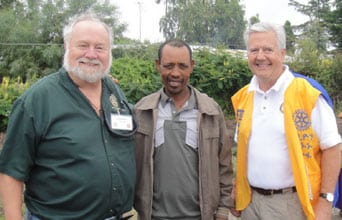ETHIOPIA WATER PROJECT
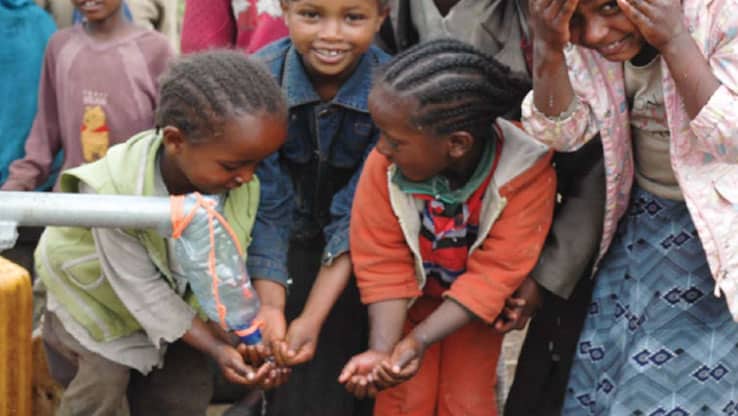
INCREASED ACCESS TO SUSTAINABLE AND SAFE WATER SUPPLY
Charlotte Rotary is teaming up with District 7680 and a dozen other clubs from the District, along with District 5030 from the Seattle area, the Rotary Foundation and World Vision to bring clean safe water to two areas within Ethiopia. Ethiopia is ranked 174 of 186 countries on the 2011 United Nations human Development index, which measures a Country’s achievements in terms of life expectancy, educational attainment, and adjusted real income.
PROJECT COST: $750,000
The total cost of the project is $750,000 and through the matching programs of the District, The Rotary Foundation, and World Vision, every Rotarian dollar is mulitplied by about 6. The Rotary Club of Charlotte has contributed $11,000 which mulitplies out to about $60,000 of the project.
BACKGROUND
In developing countries like Ethiopia, collecting water is a task routinely assigned to women and girls. The average girl walks nearly four miles, carrying 45 pounds on her head. The water that is collected is highly contaminated from people bathing in this water and animals drinking from it. Ethiopia has Africa’s second highest population–82.8 million people. Nearly 40 percent live on less than $1.25 per day (UNICEF 2012). Only 26 percent of the rural population has access to clean drinking water and just 8 percent has access to improved sanitation facilities (WHO/UNICEF 2012). This reality- along with a lack of knowledge about the dangers of using unsafe water and inadequate sanitation, and practicing improper hygiene-impacts children and families in multiple ways. Besides resulting in many preventable WASH-related diseases, lack of these necessities also contribute to increased malnutrition and decreased productivity. In sub-Saharan Aftrica, an estimated 40 billion hours every year are lost due to time spent fetching water, and globally, 443 million school days are missed annually due to WASHrelated diseases (United Nations News Service, 2010. The Angollela area and Minjar Shenkora district, face WASH challenges similar to these. Both Angollela and Minjar Shenkor are located in the the North Shoa zone of the Amhara National Regional State.
PROJECT GOAL AND OUTCOMES
The goal of the proposed Ethiopia WASH project is to significantly improve child well-being by enabling families and communities to achieve sustainable access to adequate safe water and improved sanitation facilities, and practice good hygiene. The project will serve 30,000 people over three years (October 2013 through September 2016). The expected outcomes of the project are as follows:
- Increased access to sustainable and safe water supply
- Increased access to improved sanitation and hygiene
- Communities and institutions empowered to facilitate sustainable WASH interventions
METHODS AND ACTIVITIES
Access to safe and adequate water supply has a direct impact on health, education, economic development, and overall human dignity. Under this objective, water will be supplied in any of the following ways:
- Shallow boreholes (up to 328 feet deep) equipped with a hand pump
- Surface completion of an existing borehole, including reticulation of pipelines and distribution networks as well as electromechanical work
- New deep boreholes (deeper than 328 feet) with electromechanical pumps, storage reservoirs, and distribution by pipes to water points
Each of these options has its own set of implications regarding cost per capita, extent of community participation, construction scheduling, operation and maintenance costs, and activities.
In Angollela, four shallow wells will be drilled and fitted with hand pumps, and a 50-cubic-meter storage reservoir will be constructed. In addition, a pump house will be built, a distribution pipeline will be laid, and water points will be built for an ongoing project in the area.
In the Minjar Shenkora district, the project will focus on completing electromechanical work on an existing newly drilled borehole and installing a pipeline distribution network to the Hagere Genet area.
THE NEED
The photos below show the existing conditions for the village. To get to the water, you have to push back to layer of pond scum.
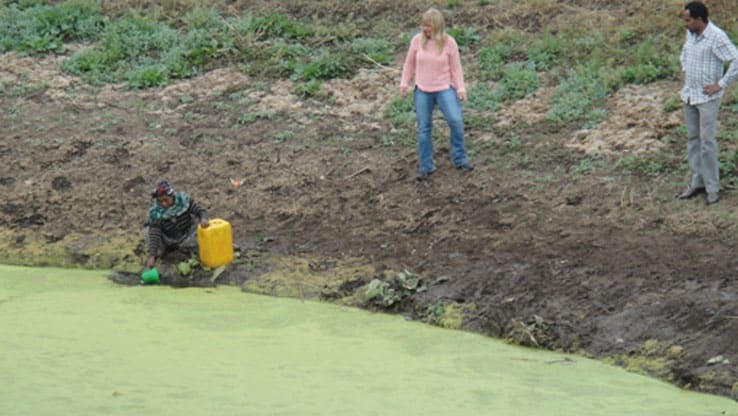
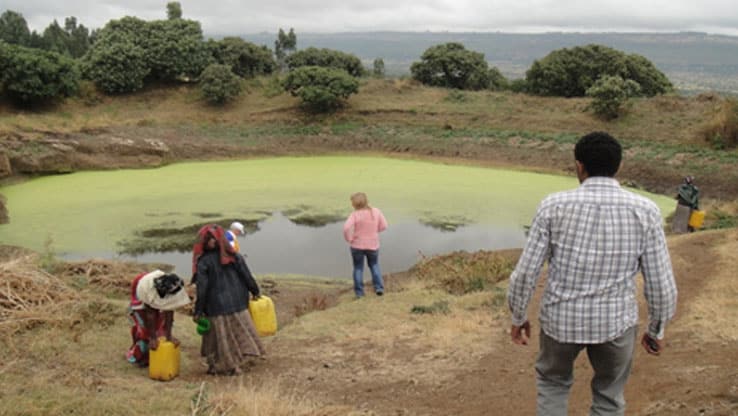
WORLD VISION REPORT
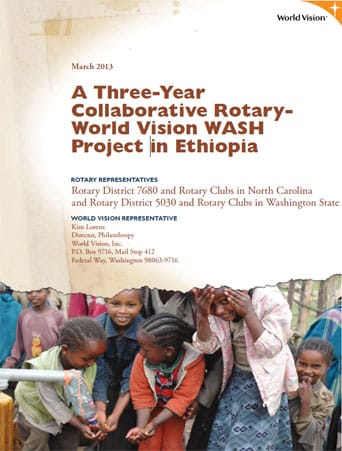
Rotary’s partner World Vision and the report for our project. View Report [pdf 1.0MB]
Ethiopia is ranked 174 of 186 countries on the 2011 United Nations human Development index, which measures a Country’s achievements in terms of life expectancy, educational attainment, and adjusted real income.

